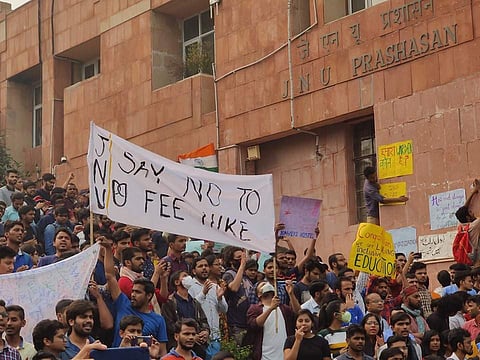

Data obtained from Jawaharlal Nehru University shows that 42 per cent of the students come from homes that have a monthly income of Rs 12,000 or less. The data for 2017-18 shows that 58 per cent of the students who took admission have shown a family income of more than Rs 12,000 per month. The students have taken to the streets to protest against the hike in fees, which they claim will force them to quit the university as it will become unaffordable.
This, JNU insiders said, can range up to a monthly income of even Rs 10 lakh or more. According to the university manual, students seeking admission are divided into three categories based on their income. They are: those whose families have an income of less than Rs 6,000 per month, between Rs 6,000 and Rs 12,000, and those above Rs 12,000. Merit points for admission are allocated based on these categories, with those belonging to the first category getting more points than the other two sections.
The admission data of the last four years clearly shows that a majority of the students belongs to the third category. Besides this, the categorisation of students was done at least 35 years ago, based on the prices prevailing then, according to former university officials. This was four years after the university's inception. Since then income levels have risen and categorisation of poverty levels has also been revised many times. Moreover, the fee was last revised in 1973.
Some protesting students admit that there are many who can afford the fee hike. "We are well aware that a good number of students, at least 50 per cent, can afford the hiked fee but our protest and fight is for the remaining 40-odd per cent of the students," said a protester. However, several students disagree to that. One student mentioned that his father earns only Rs 10,000 a month which is his pension money. And so he wouldn't be able to afford his course if the fee hike is put in place. Another student also said that his family income is only around Rs 12,000 a month as his father is a daily wage worker. Few students have also expressed their concerns over the proposed curfew timings, which they will hamper their studies as a lot of them have a culture of studying late at night.
Amidst the continuing student agitation, the JNU authorities partially rolled back the fee hike even as the university announced that BPL students would get concession. But the students have been unmoved with no end in sight of their agitation. "The best solution to the problem is to form a committee comprising students, teachers, the vice-chancellor and (HRD) ministry officials and come to a consensual decision about the hike. The issue cannot be solved by just protesting against each other," said JNU Professor Anand Kumar.
Some former JNU officials and students are in favour of the hike. "The executive committee met and recommended a discount of 50 per cent to students falling under the poverty line. They should not suffer. How this will be implemented will be clear only at the time of implementation next year. They have also announced that the security deposit will be same as before. There has been some relief," a former official said. "This is nothing in comparision with other universities. How many times can you give concession? The government should be accountable and according to the university rules. The university is given a fixed grant every year. One has to work within that. If expenses shoot up, you run to the UGC. They may give you more grant or they may refuse," he said. Former students, while condemning the behaviour of the students, said the protests should be dignified.
